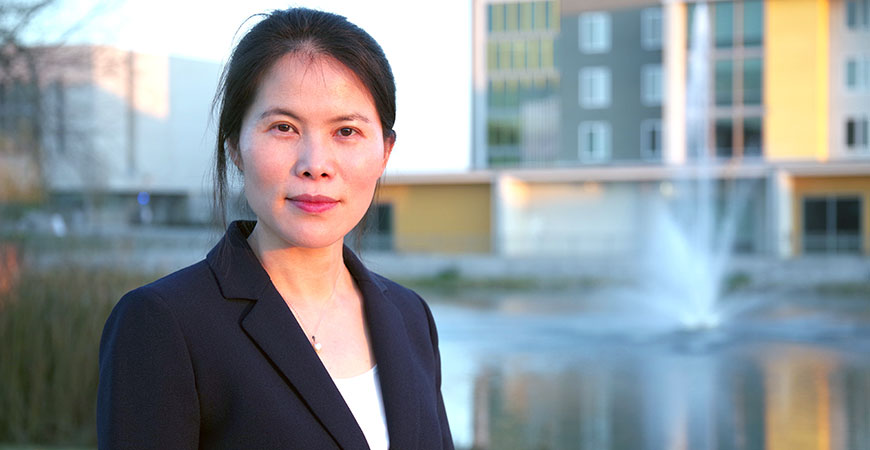
Professor Xuecai Ge, a developmental neurobiologist, has received a CAREER award for research to gain insight into the molecular mechanisms that direct brain formation, and how errors in cell signaling lead to developmental disorders.
Ge is the 31st number researcher from UC Merced to earn a CAREER award from the National Science Foundation (NSF).
CAREER awards are among the NSF’s most prestigious awards. They are given through the Faculty Early Career Development Program to recognize untenured faculty members as teacher-scholars. Early-career faculty members are selected based on three factors: the strength of their research proposals; their potential to serve as academic role models in research and education; and their leadership in their field and organizations.
Ge will receive $1.3 million over the next five years for the project “Mechanistic Studies of Cilium Proteins in Cell Signaling.”
“Most cells in our body have a primary cilium — a single hair-like projection on their surface — that allows them to interact with each other via chemical signals. This ancient and mysterious organelle acts like a radio antenna, allowing cells to receive different information, depending on which kinds of receptors their antenna contains,” Ge wrote in her proposal. “Gene mutations affecting ciliary signaling have been implicated in a host of diseases that result in the malformation and dysfunction of multiple organs.
“Surprisingly, little is known about which receptors in the primary cilia allow effective communication in the developing brain. This project will document the full catalog of receptors situated in the primary cilia of neural progenitor cells using novel techniques,” she said.
Ge and her lab focus on understanding molecular mechanisms of neurodevelopment and related diseases. The researchers delve into the developing cerebral cortex and cerebellum, and study how different cell signaling pathways integrate to govern neural stem cell proliferation and differentiation.
They aim to understand how signaling pathways are integrated at the cilium — the cell’s antenna — to control cell behaviors; how the molecular signaling pathways interact to control cell proliferation and cell fate determination in the developing brain; and how to apply what they’ve learned to clarify the pathogenesis of neural developmental disorders.
“We study how the brain is formed during embryonic development,” Ge said. “Ultimately, we aim to understand how genetic mutations lead to developmental disorders and birth defects.”
Ge has been with UC Merced since 2017. She is a member of the Department of Molecular and Cell Biology and is affiliated with the Health Sciences Research Institute .
“Professor Ge’s focus on the primary cilium in the brain is original and insightful. Her research spans disciplinary boundaries and approaches scientific questions in innovative ways,” said Professor Jennifer Manilay, department chair. “She plans to discover the specific working mechanism of a new cilium protein and study the embryonic brain to recover genuine players in neurodevelopment using her new state-of-the-art transgenic mouse model.
“This CAREER award recognizes her work as cutting edge and reflects her leadership in her field of study. In addition, the education and outreach activities she has proposed will impact STEM education in the Central Velley and the academic programs at UC Merced in positive ways.”
Each CAREER award proposal includes an educational outreach component, and Ge plans to use this opportunity to engage local K-12 students and high school teachers in laboratory research. She hopes it will inspire a sustained interest in the biological sciences among local youth. She also intends to implement an integrated educational program to promote the participation and retention of underrepresented students in biological research. The program will include undergraduate and graduate students, as well as postdoctoral fellows.
“The research in this project is technically challenging but has the potential to open new research directions in neurodevelopment,” she said. “I am excited that our work is recognized by peers in my field. It is encouraging to me and every member of my research team.”